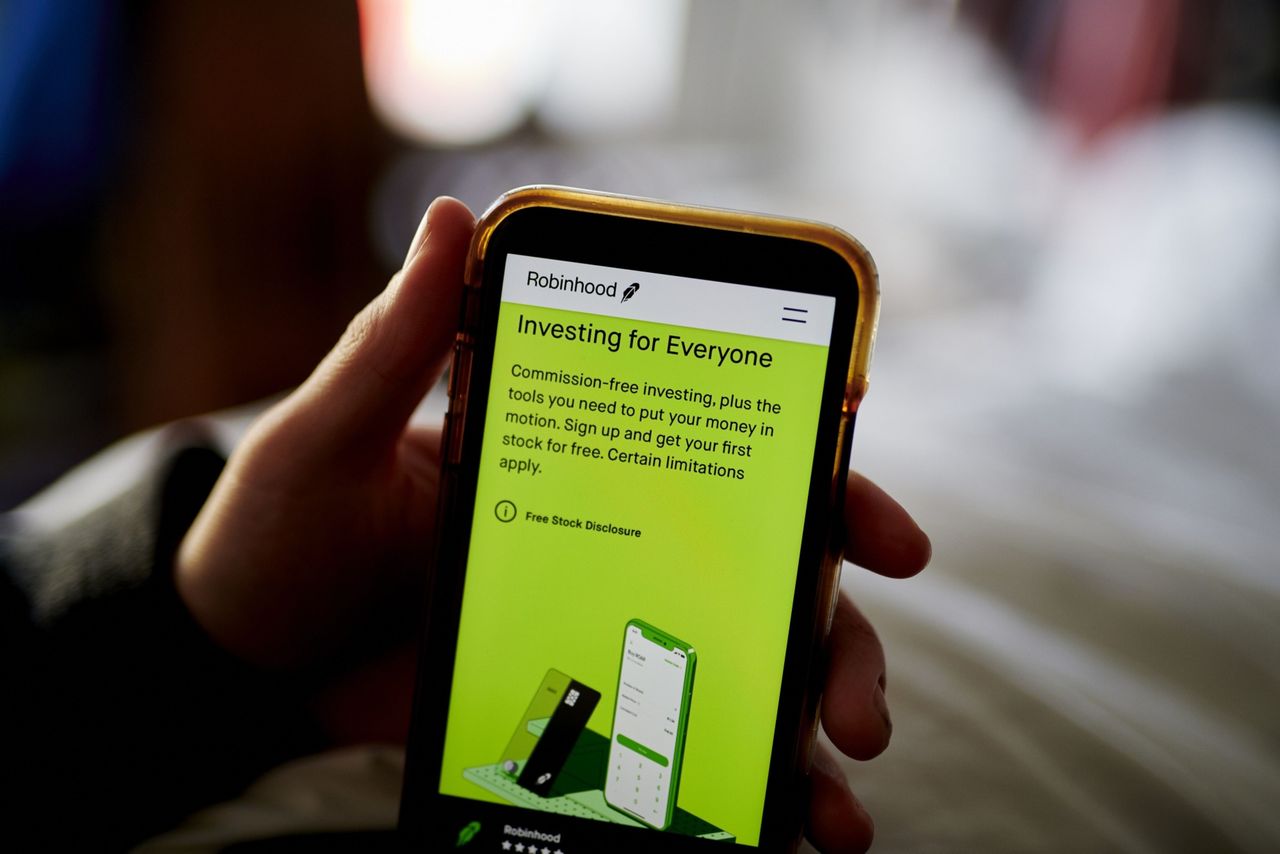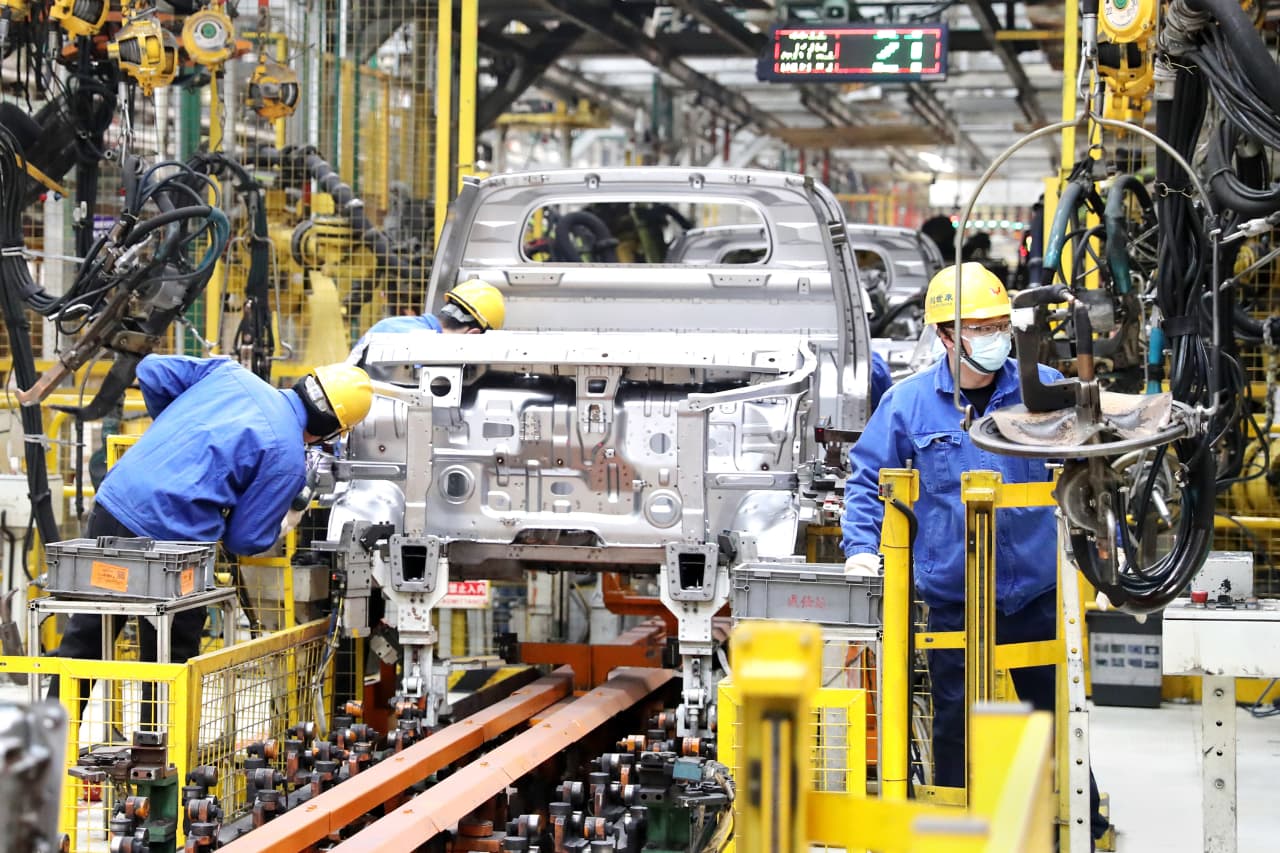Investing app Robinhood blocked access to GameStop and other highflying names on Thursday as trading surged among retail users.
The move comes after GameStop (GME) stock has shot higher over the past week, inspiring a short squeeze. The action — driven by retail traders often using options — has spread to other names like BlackBerry (BB), AMC Entertainment Holdings (AMC), and Bed Bath & Beyond (BBBY). Several of those stocks were falling in premarket trading after enormous run-ups in the past few days.
Users began reporting that they couldn’t trade GameStop and other stocks on Thursday. They got a message that “This stock is not supported on Robinhood.”
In a statement on Thursday, Robinhood detailed which stocks now had restrictions. “In light of recent volatility, we are restricting transactions for certain securities to position closing only,” the company said. These include AMC Entertainment, BlackBerry, Bed Bath & Beyond, Express (EXPR), GameStop, Koss (Koss), Naked Brand Group (NAKD), and Nokia (NOK).
“We also raised margin requirements for certain securities,” Robinhood said. The trading platform is raising margin requirements for investors in GameStop and AMC to 100%, Robinhood told Barron’s on Wednesday.
On Thursday morning, Robinhood was also reporting outages.
Other brokers have instituted similar restrictions. Interactive Brokers (IBKR) on Wednesday put AMC, BlackBerry, Express, GameStop, and Koss option trading into liquidation “due to the extraordinary volatility in the markets,” the company said.
“In addition, long stock positions will require 100% margin and short stock positions will require 300% margin until further notice,” the company said. “We do not believe this situation will subside until the exchanges and regulators halt or put certain symbols into liquidation only. We will continue to monitor market conditions and may add or remove symbols as may be warranted.”
TD Ameritrade (AMTD) also placed restrictions on some transactions in GameStop and other securities, the broker said on Wednesday. A spokeswoman didn’t specify exactly what the company was doing but said it could include “actions like increasing margin requirements, or limiting certain types of transactions, like short sales and those that may involve unlimited risk. It is not uncommon for us to make such decisions, which we consider on an individual basis, in the interest of mitigating risk.”
“We have been adjusting our requirements for several days as we continued to see trends indicating unusual volume in an unprecedented market environment, which appear to be divorced from traditional market fundamentals,” the company said. “We have made what we believe to be prudent and appropriate decisions to place some limits on certain transactions for certain securities.”
And fast-growing privately held broker Webull said it was limiting some activities, too.
“Webull has been very successful in limiting our intraday risk during the course of these events by not allowing any short positions in these volatile names since as early as Friday of last week,” CEO Anthony Denier told Barron’s. “Trading has been open for these stocks and uninterrupted amidst this volatility and the only new restrictions we have placed is not allowing market orders opening of new multi-leg option strategy positions.”
Robinhood has grown faster than the rest of the industry over the past year, attracting younger investors. Last year, it said it had more than 13 million account-holders, adding 3 million from January until May. The privately held broker was sued last month by a Massachusetts regulator on allegations that it encourages risky investing among its clientele. The company denied those allegations and said it does not recommend stocks.
On Wednesday night, Robinhood sent a notice to users directing them to educational products in light of the recent volatility.
One trader who has made money in the GameStop trade through his Webull account was frustrated by the new limits.
“It’s one thing if I had a pattern of misconduct, or a lot of violations. It’s another thing for you to tell me that you can’t trade this stock because we don’t like what’s happening to it,” Brandon Luczek, a 28-year-old who lives in Virginia, told Barron’s on Wednesday night. “That’s not for you to decide. I have my own personal risk tolerance.”
Others on reddit’s wallstreetbets forum lashed out at Robinhood. “How in the hell is this legal? They are tanking our legitimately bought and held stocks/options by arbitrarily restricting trading,” one wrote.
 Copyright 2020, Dow Jones & Company, Inc. All Rights Reserved Worldwide. LEARN MORE
Copyright 2020, Dow Jones & Company, Inc. All Rights Reserved Worldwide. LEARN MORE
What a quarter-million dollars gets you in the western capital.
Alexandre de Betak and his wife are focusing on their most personal project yet.
Multinationals like Starbucks and Marriott are taking a hard look at their Chinese operations—and tempering their outlooks.
For years, global companies showcased their Chinese operations as a source of robust growth. A burgeoning middle class, a stream of people moving to cities, and the creation of new services to cater to them—along with the promise of the further opening of the world’s second-largest economy—drew companies eager to tap into the action.
Then Covid hit, isolating China from much of the world. Chinese leader Xi Jinping tightened control of the economy, and U.S.-China relations hit a nadir. After decades of rapid growth, China’s economy is stuck in a rut, with increasing concerns about what will drive the next phase of its growth.
Though Chinese officials have acknowledged the sputtering economy, they have been reluctant to take more than incremental steps to reverse the trend. Making matters worse, government crackdowns on internet companies and measures to burst the country’s property bubble left households and businesses scarred.
Lowered Expectations
Now, multinational companies are taking a hard look at their Chinese operations and tempering their outlooks. Marriott International narrowed its global revenue per available room growth rate to 3% to 4%, citing continued weakness in China and expectations that demand could weaken further in the third quarter. Paris-based Kering , home to brands Gucci and Saint Laurent, posted a 22% decline in sales in the Asia-Pacific region, excluding Japan, in the first half amid weaker demand in Greater China, which includes Hong Kong and Macau.
Pricing pressure and deflation were common themes in quarterly results. Starbucks , which helped build a coffee culture in China over the past 25 years, described it as one of its most notable international challenges as it posted a 14% decline in sales from that business. As Chinese consumers reconsidered whether to spend money on Starbucks lattes, competitors such as Luckin Coffee increased pressure on the Seattle company. Starbucks executives said in their quarterly earnings call that “unprecedented store expansion” by rivals and a price war hurt profits and caused “significant disruptions” to the operating environment.
Executive anxiety extends beyond consumer companies. Elevator maker Otis Worldwide saw new-equipment orders in China fall by double digits in the second quarter, forcing it to cut its outlook for growth out of Asia. CEO Judy Marks told analysts on a quarterly earnings call that prices in China were down roughly 10% year over year, and she doesn’t see the pricing pressure abating. The company is turning to productivity improvements and cost cutting to blunt the hit.
Add in the uncertainty created by deteriorating U.S.-China relations, and many investors are steering clear. The iShares MSCI China exchange-traded fund has lost half its value since March 2021. Recovery attempts have been short-lived. undefined undefined And now some of those concerns are creeping into the U.S. market. “A decade ago China exposure [for a global company] was a way to add revenue growth to our portfolio,” says Margaret Vitrano, co-manager of large-cap growth strategies at ClearBridge Investments in New York. Today, she notes, “we now want to manage the risk of the China exposure.”
Vitrano expects improvement in 2025, but cautions it will be slow. Uncertainty over who will win the U.S. presidential election and the prospect of higher tariffs pose additional risks for global companies.
Behind the Malaise
For now, China is inching along at roughly 5% economic growth—down from a peak of 14% in 2007 and an average of about 8% in the 10 years before the pandemic. Chinese consumers hit by job losses and continued declines in property values are rethinking spending habits. Businesses worried about policy uncertainty are reluctant to invest and hire.
The trouble goes beyond frugal consumers. Xi is changing the economy’s growth model, relying less on the infrastructure and real estate market that fueled earlier growth. That means investing aggressively in manufacturing and exports as China looks to become more self-reliant and guard against geopolitical tensions.
The shift is hurting western multinationals, with deflationary forces amid burgeoning production capacity. “We have seen the investment community mark down expectations for these companies because they will have to change tack with lower-cost products and services,” says Joseph Quinlan, head of market strategy for the chief investment office at Merrill and Bank of America Private Bank.
Another challenge for multinationals outside of China is stiffened competition as Chinese companies innovate and expand—often with the backing of the government. Local rivals are upping the ante across sectors by building on their knowledge of local consumer preferences and the ability to produce higher-quality products.
Some global multinationals are having a hard time keeping up with homegrown innovation. Auto makers including General Motors have seen sales tumble and struggled to turn profitable as Chinese car shoppers increasingly opt for electric vehicles from BYD or NIO that are similar in price to internal-combustion-engine cars from foreign auto makers.
“China’s electric-vehicle makers have by leaps and bounds surpassed the capabilities of foreign brands who have a tie to the profit pool of internal combustible engines that they don’t want to disrupt,” says Christine Phillpotts, a fund manager for Ariel Investments’ emerging markets strategies.
Chinese companies are often faster than global rivals to market with new products or tweaks. “The cycle can be half of what it is for a global multinational with subsidiaries that need to check with headquarters, do an analysis, and then refresh,” Phillpotts says.
For many companies and investors, next year remains a question mark. Ashland CEO Guillermo Novo said in an August call with analysts that the chemical company was seeing a “big change” in China, with activity slowing and competition on pricing becoming more aggressive. The company, he said, was still trying to grasp the repercussions as it has created uncertainty in its 2025 outlook.
Sticking Around
Few companies are giving up. Executives at big global consumer and retail companies show no signs of reducing investment, with most still describing China as a long-term growth market, says Dana Telsey, CEO of Telsey Advisory Group.
Starbucks executives described the long-term opportunity as “significant,” with higher growth and margin opportunities in the future as China’s population continues to move from rural to suburban areas. But they also noted that their approach is evolving and they are in the early stages of exploring strategic partnerships.
Walmart sold its stake in August in Chinese e-commerce giant JD.com for $3.6 billion after an eight-year noncompete agreement expired. Analysts expect it to pump the money into its own Sam’s Club and Walmart China operation, which have benefited from the trend toward trading down in China.
“The story isn’t over for the global companies,” Phillpotts says. “It just means the effort and investment will be greater to compete.”
Corrections & Amplifications
Joseph Quinlan is head of market strategy for the chief investment office at Merrill and Bank of America Private Bank. An earlier version of this article incorrectly used his old title.














